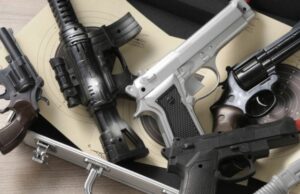The United States has a long and complex history with firearms, and the rise of gun culture in America has been a significant and often polarizing phenomenon. The evolution of gun culture has been shaped by a multitude of factors, including historical, social, political, and economic influences. Understanding this societal shift provides valuable insights into the dynamics of contemporary firearms culture and its impact on American society.

Historical Legacy: Firearms have been integral to American history, playing a central role in the nation’s founding, frontier expansion, and the development of its military and civilian identity. The right to bear arms is enshrined in the Second Amendment of the US Constitution, reflecting the historical significance of firearms in American culture.
Sports and Recreation: The growth of gun culture has been propelled by activities such as hunting, sport shooting, and recreational firearm use. These pursuits have fostered a strong community of enthusiasts who engage in shooting sports, marksmanship competitions, and outdoor activities, contributing to the fabric of American gun culture.
Political and Legal Developments: The ongoing debate surrounding gun rights, legislation, and Second Amendment advocacy has been a key element in shaping the public perception and engagement with firearms. The interplay between regulatory measures, judicial decisions, and advocacy efforts has influenced the evolution of gun culture and the rights of gun owners.
Industry and Innovation: The firearm industry has been instrumental in promoting and marketing firearms, as well as fostering a culture of firearm ownership. The innovation of new firearm technologies, accessories, and customization options has contributed to the appeal and expansion of gun culture in the US.
Media and Popular Culture: Firearms have been prominently featured in literature, film, and popular media, portraying diverse narratives that influence public perception and attitudes towards firearms. Depictions of firearms in entertainment and media have contributed to the normalization and romanticization of gun culture in American society.
Social and Identity Dynamics: Gun ownership and participation in gun-related activities have become intertwined with individual and collective identities, reflecting a sense of tradition, self-reliance, and security for many Americans. This cultural dimension has contributed to the rise and sustainment of gun culture.
Public Discourse and Policy Debates: The broadening discussions on firearms, gun violence, and public safety have further propelled the visibility and complexity of gun culture in America. These debates have influenced public opinion, legislation, and societal attitudes towards firearms.
While gun culture in America continues to evolve, it remains deeply ingrained in the nation’s heritage and social fabric. Understanding the multifaceted nature of this cultural shift is essential for engaging in informed discussions and shaping the future of firearms culture in the United States. The rise of gun culture is a complex and dynamic phenomenon that reflects the intersection of history, tradition, technology, and social dynamics within American society.
